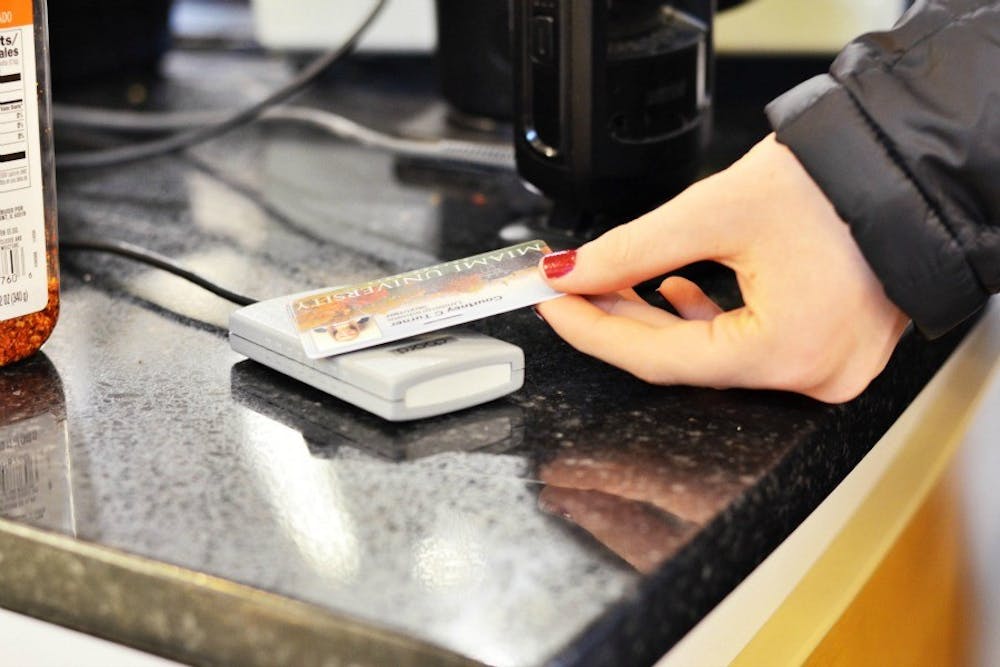By Elise Vasko, For The Miami Student
Beginning fall 2016, Miami University will institute a new meal plan system to replace the current Diplomat meal plan. The new plan will affect current first-year students, as well as all incoming students enrolling at Miami this fall.
Under the current meal plan, students have a declining balance which can be used for both dining hall buffets and a la carte locations, such as Armstrong, Maplestreet Station and Bell Tower, according to Brian Woodruff, director of the Housing Options, Meals & Events (H.O.M.E.) Office. On the new plan, students will pay for a set number of buffet meals each semester, in addition to a declining balance for a la carte locations.
"The current plan is completely flexible, but along with that flexibility comes a high cost, because in order to give that kind of flexibility we have to have some amount of money that we know is a fixed income that we can plan our operations on," said Woodruff.
The cost lies in the $1,625 program assessment fee, which every student living on campus is required to pay for Miami's dining service operations.
Woodruff said the H.O.M.E. Office continued to hear strong dislike of the program assessment fee from students and parents, which was the primary reason for the new meal plan.
"Some things we've heard loud and clear is that students want more value, they want to feel like they're getting more for their money, they want transparency, they want it to be easy to understand and also to remain flexible," said Woodruff.
As the plan is now, students choose to pay an average amount of $1,200 toward their declining balance, on top of the program assessment fee. The new plan effectively eliminates this upfront cost, and provides students with three different plan options - minimum, standard and premium.
On the standard plan, students pay a total cost of $2,400 per semester and, with this, they receive 262 buffet meals and $500 of a declining balance. Students can use their buffet meal "swipes" at Miami's four dining hall locations: Garden Commons, Harris Dining Hall, Western Dining Hall, and Martin Dining Hall, which will be operational again in fall 2016.
"The goal has been to make the plans more affordable," said Woodruff. "It's a substantial difference, even with all fees included for the standard level, for about $1,000 less you're able to get the same amount of meals."
For an example calculation, when you add the current cost of 262 buffet meals plus the $500 declining balance (which is what each student gets on the new standard plan) students will get the same level of purchase power as if they were at the current $2,500 level, not including the program assessment fee.
Next year, with the base fee lowered to $400, students on the standard plan will save $1,325 for the same amount of meals.
Enjoy what you're reading?
Signup for our newsletter
Some first-year students, who will experience the new plan in the fall, are concerned that they will have less money to spend at their favorite a la carte locations.
"I like the new meal plan in the sense that it's saving you money, but on the other hand, I don't like how it restricts you more from going to the a la carte places," said first-year Sara Felton. "I feel like I eat more at those than in the dining halls."
Woodruff said that, while the plan is structured to encourage students to eat at dining hall locations, he also does not think it discourages places like Armstrong, Maplestreet and Bell Tower.
"That's why the declining balance portion is part of it as well," said Woodruff.
Unspent declining balance dollars will continue to roll over from semester to semester and year to year, according to Woodruff.
First-year Sooraj Kanchanlal said he thinks the new meal plan will force students to adjust their eating habits.
"Students will probably eat in the dining halls more, especially for breakfast and dinner," said Kanchanlal. "But people will still go to a la carte places for lunch, since they're near classes so they're more convenient."
Another disappointment for students is they will no longer receive the same discounts that are now in place as part of the current Diplomat meal plan. With the plan as it is now, students receive a 50 percent discount at dining halls and a 30 percent discount at a la carte locations.
"The one thing I don't like about the new plan is that it gets rid of the discounts," said Kanchanlal. "Thirty percent is a lot."
However, the removal of these discounts was part of how the H.O.M.E. Office was able to lower the overall expense for students.
"The discounts were completely connected with the program assessment fee," said Woodruff. "Now that that's gone, the discounts are gone, too, but you're still going to be saving money for the same amount of food, and your overall costs are going down."
More detailed information on the specific costs and levels of the new meal plan can be found on the H.O.M.E. Office website.




